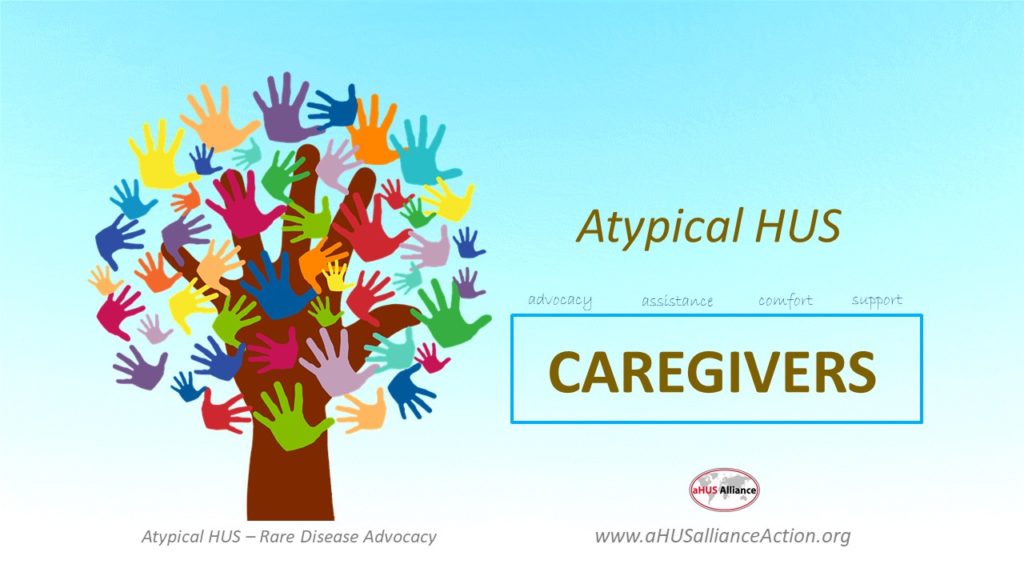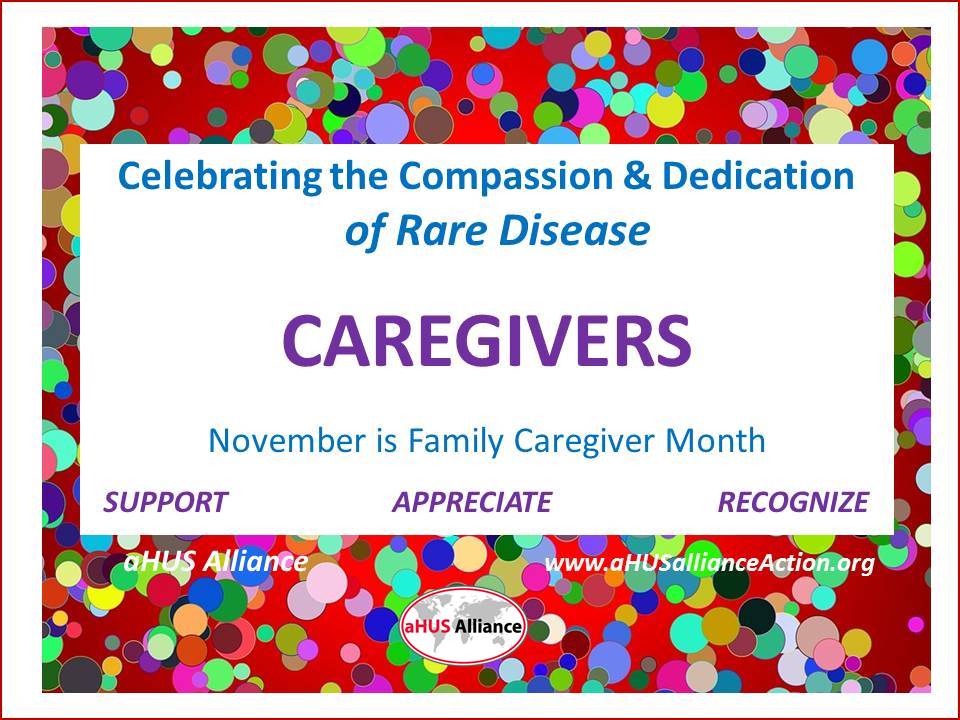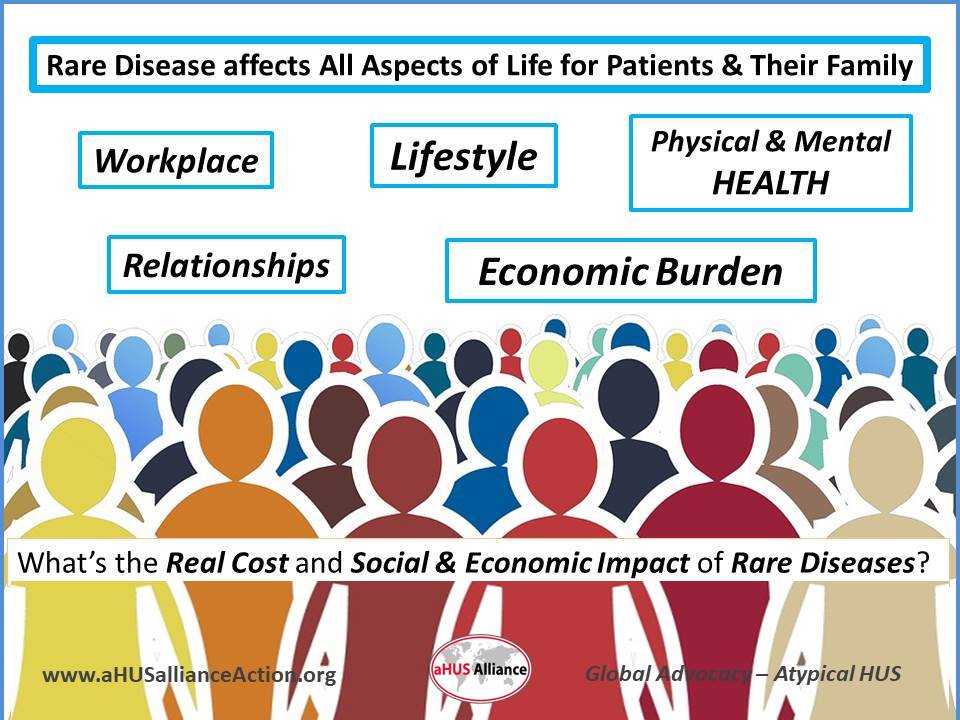
Atypical HUS families emphasize and embody the ‘care’ portion of the word ‘caregiver’. Many of those caring for someone with atypical HUS are family members, filling a vital but unpaid role to assist, coordinate and support a child or an adult as they navigate daily life impacted by this very rare disease. Whether in sickness or in health, aHUS family caregivers (aka ‘carers’) around the world have stepped forth to help their loved ones manage the many aspects of living with atypical HUS. We’re so very grateful to aHUS carers and the positive difference they make in our lives.
This very rare disease affects only a handful of people per million so it’s understandable that there won’t be a pamphlet about aHUS among the brochures at your doctor’s office, nor listings for meeting sites under your area’s local ‘support groups’. To bridge the gap, our aHUS Alliance Global Action team offers some resources here likely to prove helpful to aHUS families and their caregivers. Whether you’re a parent, partner, relative, or friend providing support to someone diagnosed with atypical HUS, there are likely common situations you’ve experienced – although from vastly different viewpoints.
A diagnosis of atypical HUS not only affects the individual, but also impacts their family and relationships. Concerns like medical appointments, treatment, and diet can throw everyone’s lifestyle a curve. Work or school attendance, as well as performance, can become erratic due to the effects of aHUS and may be difficult for others to understand. Here are some of the sticky bits that aHUS patients and caregivers often stumble over when trying to explain the need to unexpectedly adjust schedules and to accommodate aHUS issues in daily life.
Most cases of aHUS involve kidney damage, but since a core problem is tiny clots in small blood vessels, there could occur a sudden and dramatic decline in health without any warning.
It depends on where the clotting action (thrombotic microangiopathy, or TMA) occurs in the body. If tiny clots form in the heart, brain or lungs there’s potential to cause an unexpected and life-threatening event.
Atypical HUS episodes vary greatly in duration, so years could pass without apparent disease activity but other times aHUS presents as frequent events or can continue in the form of chronic illness.
There’s no way to predict when or if atypical HUS activity will ramp up. Any conditions that trigger an immune system response (like infection, injury, pregnancy, certain drugs or illnesses) may cause aHUS to occur or relapse.
Atypical HUS is an ‘invisible disease’. We monitor our health with urinalysis and blood tests, but many aHUS patients look perfectly fine at first glance. By the time we move from vague symptoms (such as fatigue, nausea, head or stomach aches, unexplained bruising) to observable blood in urine, delayed response may be enough to merit immediate patient hospitalization.
There’s no specific test for aHUS, and symptoms vary greatly from patient to patient. There’s little for anyone at school or work to “watch for” as a signal that illness is imminent.
Mental confusion and short term memory may impact abilities and skills, and fatigue. Work speed and/or work quality may decline, with potential need for adjustment to expectations and performances needed at work or at school.
Anemia due to red blood cell destruction may cause fatigue and indicate the need to adjust lifestyle and activities.
It’s not just about the disease itself, nor the issues surrounding aHUS treatment and the uncertainty about when episodes will occur and how severe they might be. It’s not just that we need to be vigilant about trying to reduce our exposure to germs and any illness that causes sickness in others (such as flu, COVID-19 virus). It’s not about adjusting family schedules to accommodate doctor’s visits or treatment (dialysis, medications, infusions). Additionally then, what IS it about?
It’s about everything that goes along with dealing long-term with a serious medical condition. Anxiety. Stress. Helplessness. Guilt. Depression. Relationship difficulties. Economic concerns. A focus on the disease, instead of the person. For those people who deeply identify with physically rigorous activities such as sports, physical arts, or outdoor recreation/work, some may experience a sense of grief or feeling a ‘loss of self’. Having a rare disease diagnosis can lead aHUS patients and their families into feeling isolated or not understood by others who haven’t faced such challenges in their lives. It’s not about our rare disease, it’s about everything else that the general public often hasn’t associated with it. And this is sometimes even more true for caregivers than for the patient themselves.
Caregivers face emotional, financial, physical, and social strain with little support from outside resources. For rare disease patients and their families, the people who provide care and support can make a real and very positive difference across varied areas of life. People and groups within your ‘circle of support’ are extremely valuable in many respects, from patients as well as family caregiver viewpoints. Resources for caregivers vary greatly across regions and countries, so we encourage you to look for nation-specific resources across the variety of kidney, genetic, and rare disease organizations.
The aHUS Alliance Global Action team is a small group of international volunteers who are atypical HUS patients and family caregivers, serving to share information and aid connections for aHUS patient groups in over 30 nations.
HELPFUL RESOURCES for aHUS Caregivers
VIDEOS
*Created specifically for the aHUS Community: Rare Disease Challenges: Support for Patients & Families (Dr Jody L Jones, Clinical Psychologist)
*TEDx: Rare Disease Carers Caring for the Caregivers: 3 Tools for Self-Care (One family’s experience on how a Rare Disease affects all in the family)
Caregiver Organizations: Info & Resources
*Caregiver Action Network: www.rarecaregivers.org visit their Family Caregiver Toolbox
*Carers UK: www.carersuk.org visit their toolbox for Help & Advice
*Support for UK Families Rainbow Trust
*National Alliance for Caregiving, USA www.caregiving.org
*National Family Caregiver Support Program, USA (ACL.gov)
*Family Caregiver Alliance Caregiving 101, Caring for Another & Yourself
Caregiving: SPECIFIC TOPICS
aHUS Alliance (articles)
*It’s not about my Rare Disease (it’s about all that goes along with it)
*Transitioning from Pediatric to Adult Care
Caring for Caregivers
*Tips for Taking Care of Yourself (Mayo Clinic)
*A Guide to Taking Care of Yourself (Family Caregiver Alliance)
*Caregiver Guide to Stress & Burnout (Caring.com)
*Caregiver Depression (Info & Tips, Caregiver Action Network)
Support from Friends & Others
*How to Help a Friend or Loved One Suffering from a Chronic Illness (American Psychological Association) Also available in Spanish
*5 Ways to Help a Friend Who Has a Rare Disease (CSL Behring)
Mental Health & Rare Disease
*Mental health and self care resources for rare patients and caregivers (Global Genes, Resource Hub)
*Rare Disease Patients Are At Risk of Depression and Anxiety (CSL Behring)
For Parents (see also Relationships)
*Caring for a Seriously Ill Child (Kids Health by Nemours Foundation)
*Siblings of Children with Chronic Illnesses (American Academy of Pediatrics)
*Students With Chronic Illnesses: Guidance for Families, Schools, and Students (NIH article)
*Balancing Academics and Serious Illness (Nemours Foundation)
Relationships – Family
*Siblings of Children with Chronic Illnesses (American Academy of Pediatrics)
*What is it like to have a Sibling with a Rare Disease? (Share4Rare)
*Challenges of having a Sibling with a Rare Disease (Personal experience, re the rare disease HH)
*Helping Your Teen Cope with Chronic Illness
*When your Grandchild lives with a Rare Disease (the Mighty)
*Living with a Chronic Illness – Dealing with Feelings (NIH Library of Medicine) Also available in Spanish
Relationships – Personal
*How to Cope When Your Partner Has a Chronic Health Issue (VeryWell Mind)
*Holding onto Intimacy when Caring for your Spouse (Caregiver Action Network)
*Dating: Telling a romantic Partner about your Rare Disease (Global Genes)
*Finding Love with a Rare Disease (‘Rare Is’ community)
Relationships – OTHER
*Video Library, various Topics: Solo Parenting, Marriage, Rare Dads, Building a Support Network (Courageous Parents Network)
*Workers Affected by Chronic Conditions: How can workplace policies and programs help? (Georgetown University
* Juggling Care & Life (2017 Survey report PDF, EURORDIS)
November is Caregiving Month



